Book 4 Unit 1 阅读 教案
Unit+4+Reading+and+Thinking+教案 高中英语人教版(2019)必修第一册
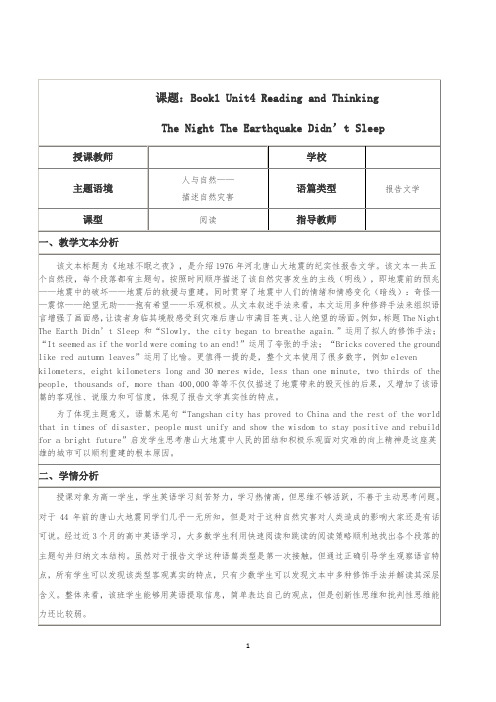
课题:Book1 Unit4 Reading and ThinkingThe Night The Earthquake Didn’t Sleep 授课教师学校人与自然——语篇类型报告文学主题语境描述自然灾害课型阅读指导教师一、教学文本分析该文本标题为《地球不眠之夜》,是介绍1976年河北唐山大地震的纪实性报告文学。
该文本一共五个自然段,每个段落都有主题句。
按照时间顺序描述了该自然灾害发生的主线(明线),即地震前的预兆——地震中的破坏——地震后的救援与重建。
同时贯穿了地震中人们的情绪和情感变化(暗线):奇怪——震惊——绝望无助——抱有希望——乐观积极。
从文本叙述手法来看,本文运用多种修辞手法来组织语言增强了画面感,让读者身临其境般感受到灾难后唐山市满目苍夷、让人绝望的场面。
例如,标题The Night The Earth Didn’t Sleep 和“Slowly, the city began to breathe again.”运用了拟人的修饰手法;“It seemed as if the world were coming to an end!”运用了夸张的手法;“Bricks covered the ground like red autumn leaves”运用了比喻。
更值得一提的是,整个文本使用了很多数字,例如eleven kilometers, eight kilometers long and 30 meres wide, less than one minute, two thirds of the people, thousands of, more than 400,000等等不仅仅描述了地震带来的毁灭性的后果,又增加了该语篇的客观性、说服力和可信度,体现了报告文学真实性的特点。
为了体现主题意义,语篇末尾句“Tangshan city has proved to China and the rest of the world that in times of disaster, people must unify and show the wisdom to stay positive and rebuild for a bright future”启发学生思考唐山大地震中人民的团结和积极乐观面对灾难的向上精神是这座英雄的城市可以顺利重建的根本原因。
外研版Book4 Unit1语法教学活动设计
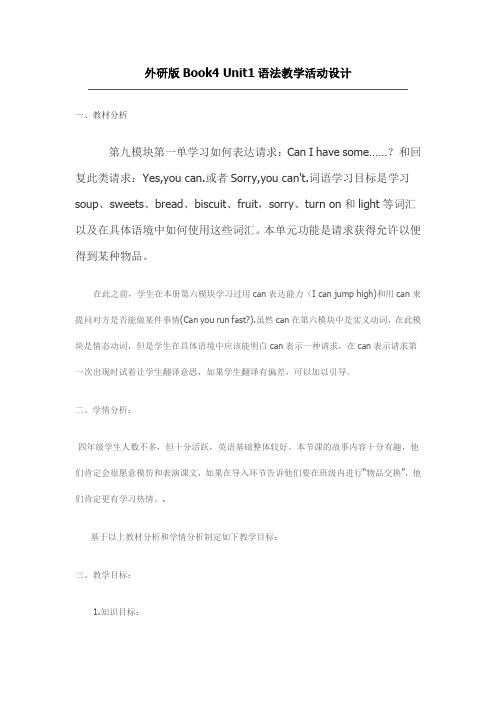
外研版Book4 Unit1语法教学活动设计一、教材分析第九模块第一单学习如何表达请求:Can I have some……?和回复此类请求:Yes,you can.或者Sorry,you can't.词语学习目标是学习soup、sweets、bread、biscuit、fruit,sorry、turn on和light等词汇以及在具体语境中如何使用这些词汇。
本单元功能是请求获得允许以便得到某种物品。
在此之前,学生在本册第六模块学习过用can表达能力(I can jump high)和用can来提问对方是否能做某件事情(Can you run fast?).虽然can在第六模块中是实义动词,在此模块是情态动词,但是学生在具体语境中应该能明白can表示一种请求,在can表示请求第一次出现时试着让学生翻译意思,如果学生翻译有偏差,可以加以引导。
二、学情分析:四年级学生人数不多,但十分活跃,英语基础整体较好。
本节课的故事内容十分有趣,他们肯定会很愿意模仿和表演课文,如果在导入环节告诉他们要在班级内进行“物品交换”,他们肯定更有学习热情。
.基于以上教材分析和学情分析制定如下教学目标:三、教学目标:1.知识目标:让学生在具体语境中听懂Can I have some ……?并做出相应回答,让学生能用Can I have some ……?表达请求。
由于本节课新单词较多,学生对重点句型的掌握不受单词限制,95%学生能对新单词认读,其余学生不要求掌握本节课所有新单词,能读和知道下列单词的意思:sorry、soup、sweets、biscuits 和fruit 即可,对dark、turn on 和light 只要求学生知其义。
2.情感目标:在小组自主、互助、合作学习中相互合作、建设和谐班集体,在活动中体验学习的乐趣。
3.语言运用目标:在“物品交换”活动中,能运用Can I have some ……?征求他人意见以达到和对方交换个人物品的目的。
PEP小学英语四年级上册Unit1教案优秀7篇
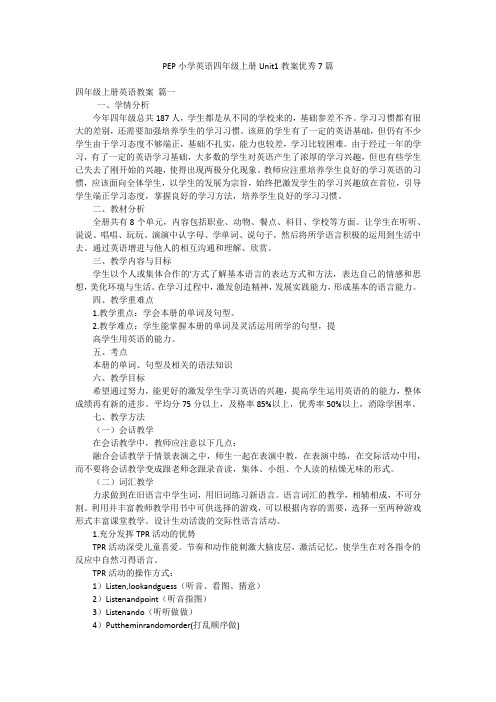
PEP小学英语四年级上册Unit1教案优秀7篇四年级上册英语教案篇一一、学情分析今年四年级总共187人,学生都是从不同的学校来的,基础参差不齐。
学习习惯都有很大的差别,还需要加强培养学生的学习习惯。
该班的学生有了一定的英语基础,但仍有不少学生由于学习态度不够端正,基础不扎实,能力也较差,学习比较困难。
由于经过一年的学习,有了一定的英语学习基础,大多数的学生对英语产生了浓厚的学习兴趣,但也有些学生已失去了刚开始的兴趣,使得出现两极分化现象。
教师应注重培养学生良好的学习英语的习惯,应该面向全体学生,以学生的发展为宗旨,始终把激发学生的学习兴趣放在首位,引导学生端正学习态度,掌握良好的学习方法,培养学生良好的学习习惯。
二、教材分析全册共有8个单元,内容包括职业、动物、餐点、科目、学校等方面。
让学生在听听、说说、唱唱、玩玩、演演中认字母、学单词、说句子,然后将所学语言积极的运用到生活中去。
通过英语增进与他人的相互沟通和理解、欣赏。
三、教学内容与目标学生以个人或集体合作的'方式了解基本语言的表达方式和方法,表达自己的情感和思想,美化环境与生活。
在学习过程中,激发创造精神,发展实践能力,形成基本的语言能力。
四、教学重难点1.教学重点:学会本册的单词及句型。
2.教学难点:学生能掌握本册的单词及灵活运用所学的句型,提高学生用英语的能力。
五、考点本册的单词、句型及相关的语法知识六、教学目标希望通过努力,能更好的激发学生学习英语的兴趣,提高学生运用英语的的能力,整体成绩再有新的进步。
平均分75分以上,及格率85%以上,优秀率50%以上,消除学困率。
七、教学方法(一)会话教学在会话教学中,教师应注意以下几点:融合会话教学于情景表演之中,师生一起在表演中教,在表演中练,在交际活动中用,而不要将会话教学变成跟老师念跟录音读,集体、小组、个人读的枯燥无味的形式。
(二)词汇教学力求做到在旧语言中学生词,用旧词练习新语言。
外研社教材Book I Module 4 Unit 1

Step 6 Listen and read
1.Students listen to the tape of Activity 3.
2.Read after the tape, then read together and then in pairs.
This is a picture of…..
This is Tony. He has got a….
He hasn’t got any….
(2).Label the family members in the picture.
设计意图:利用生动的图片激发学生的学习兴趣,呈现话语主题:family。口头训练让学生能够更好地掌握目标语言。先口头讨论再笔头写下来的做法充分体现了由易到难的学习规律。学生通过同伴讨论合作的形式,既增进了同学之间的感情,又提高了学生的交际能力和合作能力。
六、教学反思
本节课以家庭为话题,学习重点是对家庭成员的介绍。训练重点是there be句型的使用和熟练用英语称呼家庭成员,由于班级内可能会有单亲家庭,因此在授课时我特别注意了保护学生,不伤及学生的自尊。同时在课堂上注意培养学生的移情能力,并且为本次活动制定了方向,并提出了活动的目标,并有意识的引导学生提炼说什么为什么说。
2、学生全员参与:注意培养学生的自主学习的能力、互助合作学习的能力、发现问题和解决问题的能力。比如:在讲授课文时,进行听力练习之后,让学生自读课文,并找出自己不明白和不理解的问题。在小组内先行解决,小组内解决不了的由教师再统一进行讲解。最后,教师再强调一些重点句子和句型,并就重点知识对学生进行提问。在学习的过程中难免会遇到各种各样的问题,有些不是个人所能解决的,需要共同的讨论。当然合作并不是简单的告诉答案和变相的抄袭,也不是不加以思考的去问别人,而应带着疑问,带着自己的观点和别人讨论,倾听别人的观点,吸取别人的长处,学习别人独特的解题方法,在争论中明白题目的本意,在合作中升华自己。又如:我设计了pair work ,group work等大量的合作学习形式,让学生在学到新知识的同时,更体会到了合作的重要性。
新标准大学英语BOOK4-unit2教案-李骠
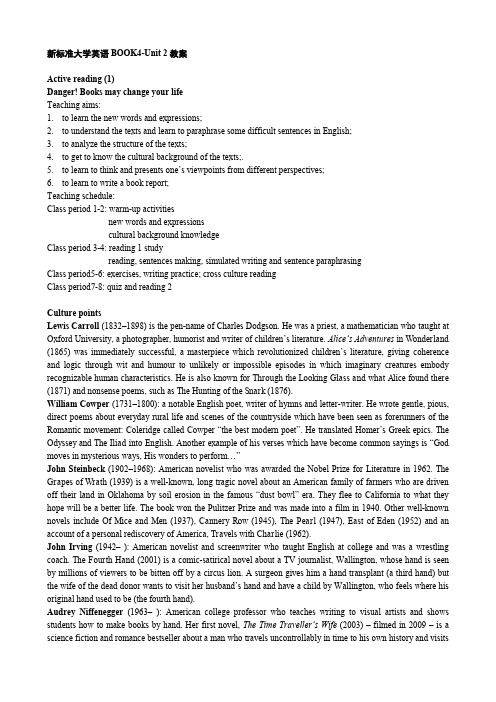
新标准大学英语BOOK4-Unit 2教案Active reading (1)Danger! Books may change your lifeTeaching aims:1.to learn the new words and expressions;2.to understand the texts and learn to paraphrase some difficult sentences in English;3.to analyze the structure of the texts;4.to get to know the cultural background of the texts;.5.to learn to think and presents one’s viewpoints from different perspectives;6.to learn to write a book report;Teaching schedule:Class period 1-2: warm-up activitiesnew words and expressionscultural background knowledgeClass period 3-4: reading 1 studyreading, sentences making, simulated writing and sentence paraphrasingClass period5-6: exercises, writing practice; cross culture readingClass period7-8: quiz and reading 2Culture pointsLewis Carroll (1832–1898) is the pen-name of Charles Dodgson. He was a priest, a mathematician who taught at Oxford University, a photographer, humorist and writer of children’s literature. Alice’s Adventures in Wonderland (1865) was immediately successful, a masterpiece which revolutionized children’s literature,giving coherence and logic through wit and humour to unlikely or impossible episodes in which imaginary creatures embody recognizable human characteristics. He is also known for Through the Looking Glass and what Alice found there (1871) and nonsense poems, such as The Hunting of the Snark (1876).William Cowper (1731–1800): a notable English poet, writer of hymns and letter-writer. He wrote gentle, pious, direct poems about everyday rural life and scenes of the countryside which have been seen as forerunners of the Romantic movement: Coleridge called Cowper “the best modern poet”. He translated Homer’s Greek epics. The Odyssey and The Iliad into English. Another example of his verses which have become common sayings is “God moves in mysterious ways, His wonders to perform…”John Steinbeck (1902–1968): American novelist who was awarded the Nobel Prize for Literature in 1962. The Grapes of Wrath (1939) is a well-known, long tragic novel about an American family of farmers who are driven off their land in Oklahoma by soil erosion in the famous “dust bowl” era. They flee to California to what they hope will be a better life. The book won the Pulitzer Prize and was made into a film in 1940. Other well-known novels include Of Mice and Men (1937), Cannery Row (1945), The Pearl (1947), East of Eden(1952) and an account of a personal rediscovery of America, Travels with Charlie (1962).John Irving (1942–): American novelist and screenwriter who taught English at college and was a wrestling coach. The Fourth Hand (2001) is a comic-satirical novel about a TV journalist, Wallington, whose hand is seen by millions of viewers to be bitten off by a circus lion. A surgeon gives him a hand transplant (a third hand) but the wife of the dead donor wants to visit her husband’s hand and have a child by Wallington, who feels where his original hand used to be (the fourth hand).Audrey Niffenegger (1963–): American college professor who teaches writing to visual artists and shows students how to make books by hand. Her first novel, The Time Traveller’s Wife (2003) – filmed in 2009 – is a science fiction and romance bestseller about a man who travels uncontrollably in time to his own history and visitshis wife in her childhood, youth and old age. His wife needs to cope with his absences and dangerous life while he travels. The story is a metaphor for distance and miscommunication in failed relationships.Paul Torday (1946– ): a British busines sman who worked for a company that repaired ship’s engines for many years. Salmon Fishing in the Yemen (2007) was his first novel. It is a political satire and comedy about a dull civil servant who becomes involved in a plan to populate the desert with Scottish salmon. Politicians manage the media to “spin” this as a plan they support in order to divert attention from problems in the Middle East. There are themes of cynicism and belief, and East-West culture clashes.Aleksandr Solzhenitsyn (1918–2008): a Russian writer who was imprisoned in Soviet labour camps in 1945; after eight years, he was exiled to Kazakhstan and not freed until 1956, when he became a teacher. In 1970 he was awarded the Nobel Prize for Literature but not receive it until 1974. He went to Germany, Switzerland and the USA, returning to Russia in 1994. His best known novels were based on his experiences as a prisoner and include: One Day in the Life of Ivan Denisovich (1962), Cancer Ward (1968), The Gulag Archipelago (1974–1978). His later works were about Russian history and identity.Graham Greene (1904–1991): a British novelist, short-story writer, playwright, travel writer and essayist. He wrote a number of thrillers (he called them ‘entertainments’) which dramatize an ambiguous moral dilemma, often revealing guilt, treachery, failure and a theme of pursuit. Greene was also a film critic and all of these novels have been made into films: Brighton Rock (1938), The Power and the Glory (1940), The Heart of the Matter (1948), The Third Man (1950), The Quiet American (1955), and Our Man in Havana (1958).E. M. Forster (1879–1970): a British novelist and writer of short stories and essays. He lived at different periods in Italy, Egypt and India and taught at Cambridge University. His best known novels include A Room with a View (1908), Howard’s End (1910), A Passage to India (1924) which have all been made into films. His writing about reading and writing includes a book of lectures, Aspects of the Novel (1927).Thomas Merton (1915–1968): an American Catholic writer, who was a Trappist monk in Kentucky. He wrote over 70 books, including many essays about Buddhism and a translation into English of the Chinese classic, Chuang Tse. He had a great deal to say about the meeting of Eastern and Western cultures and wrote many letters to writers, poets, scholars and thinkers. He read a lot in English, Latin, French and Spanish and said he always had at least three books which he was reading at any one time.William Blake (1757–1827): a British poet, artist and mystic, who read widely in English, French, Italian, Latin, Greek and Hebrew. He made many engravings to illustrate the work of such writers as Virgil, Dante and Chaucer, as well as his own poems. He stressed that imagination was more important than rationalism and the materialism of the 18th century and criticized the effects of the industrial revolution in England, but his work was largely disregarded by his peers. He is best known for his poetry in Songs of Innocence (1787) and Songs of Experience (1794). His belief in the oneness of all created things is shown in his much-quoted verse, “To see the world in a grain of sand / And a heaven in a flower, / Hold infinity in the palm of your hand / And eternity in an hour.”Clifton Fadiman (1904–1999): an American writer, radio and TV broadcaster and editor of anthologies. For over 50 years he was an editor and judge for the Book-of-the-Month Club. In 1960 he wrote a popular guide to great books for American readers, The Lifetime Reading Plan, which discusses 133 authors and their major work: the 1997 edition includes 9 authors from China.J. K. Rowling (1965–): British writer of the seven Harry Potter fantasy books. She studied French and Classics at Exeter University, before teaching English in Portugal and training to teach French in Scotland. The main idea about a school for wizards and the orphan Harry Potter came on a delayed train journey from Manchester to London in 1990. She began to write as soon as she reached London. Twelve publishersrejected the first book before Bloomsbury, a small London publisher, agreed to publish it. Later books have repeatedly broken all the sales records (as have some of the films). She is one of the richest women in the UK and a notable supporter of many charities.Language points1 Variety’s the very spice of life, / That gives it all its flavour … (Para 2)Spices are made from plants and added to food to give it its particular flavour or taste. The English proverb “Variety is the spice of life” (the proverb comes from Cowper’s poem) therefore means that variety gives life extra value and allows you to appreciate life in particular ways.2 We learn to look beyond our immediate surroundings to the horizon and a landscape far away from home. (Para 3)This means that through reading we learn to look beyond our immediate experience or familiar environment to things beyond our immediate experience, ie to completely different things that we can imagine and experience through books.3 When a baseball player hits a home run he hits the ball so hard and so far he’s able to run round thefour bases of the diamond, and score points not only for himself but for the other runners alreadyon a base. (Para 9)In the American game of baseball, the field of grass is diamond-shaped and has four bases (specific points marked around the diamond), round which players must run to score points. One team bats (ie team members take turns to hit the ball and run round the bases) and the members of the other team throw (pitch) the ball and, when it is has been hit, try to catch it or get it quickly to one of the four bases. If a batting player can hit the ball hard enough, he can run round all four bases before the other team can get the ball and thus score maximum points – with a home run. In the passage, a really good book is a home run.3 Choose the best answer to the questions.1 Why are we like Alice in wonderland when we read a book?(a) Because, like Alice, we often have accidents.(b) Because reading makes us feel young again.(c) Because reading opens the door to new experiences.(d) Because books lead us into a dream world.2 According to the writer, what is the advantage of reading over real life?(a) There is more variety in books than in real life.(b) We can experience variety and difference without going out of the house.(c) The people we meet in a book are more interesting than real people.(d) It’s harder to make sense of real life than a book.3 What do the seven novels listed in Paragraph4 have in common?(a) Their titles stimulate imagination.(b) They represent the best writing by British and American novelists.(c) They have become classics.(d) You can find all of them in any local library.4 At what moment in our lives do books become important?(a) As soon as we start reading.(b) When we start buying books to fill our shelves at home.(c) When we start listening to bedtime stories.(d) Only when we are ready for books.5 What claim did Merton make about the poems of William Blake?(a) They were similar to the works of the Greek writers and thinkers.(b) They helped him understand the meaning of life.(c) They created a sense of confusion.(d) They taught him a lot about modern culture.6 What is meant by a home-run book?(a) A book which is so good you are unable to put it down.(b) A book that the whole family can enjoy.(c) A children’s book that is read and appreciated by adults.(d) A book that hits hard like a home run in the game of baseball.Dealing with unfamiliar words4 Match the words in the box with their definitions.1 to make someone feel that they do not belong to your group (exclude)2 to fail to do something that you should do (neglect)3 to mention something as an example (cite)4 to be strong enough not to be harmed or destroyed by something (withstand)5 in most situations or cases (normally)6 to be about to happen in the future (await)5 Complete the paragraph with the correct form of the words in Activity 4.When I lived in Britain, one of my favourite radio programmes was ca lled “Desert Island Discs”. The format was always the same: Guest celebrities were asked to imagine they had been washed ashore on a desert island, and had to choose nine books – (1) excluding the Bible and Shakespeare, which they were already provided with – to take with them to the island, to help them (2) withstand the physical and mental isolation. I sometimes like to think which books I would take. (3) Normally, like most people, I don’t have much time for reading, and I could (4) cite dozens of books which I have never read but which I w ould like to. It’s an opportunity I have (5) awaited all my life, in fact. But what would I choose? Mostly novels, probably, but I wouldn’t (6) neglect to include a volume or two of poetry. My first choice, I think, would be Tolstoy’s War and Peace. I’ve never read it, but I’m ready to believe that it is one of the most marvelous books ever written.6 Replace the underlined words with the correct form of the words in the box.1 In a good novel, the writer and reader communicate with each other. (interact)2 I have to face up to the problem sooner or later. (confront)3 I read the book in one sitting and Mary did too. (likewise)4 E. M. Forster was one of the most important and respected British novelists of the 20th century. (influential)5 Do you believe that a work of literature can actually lead to social changes? (induce)6 Robert Burns was a great poet who wrote in the language variety spoken in Scotland. (dialect)7 The Time Traveller’s Wife is the story of a man who has a strange and inexplicable genetic disorder. (mysterious)7 Answer the questions about the words.1 If you have had a disconcerting experience, do you feel a bit (a) tired, or (b) confused?2 If you have a vista of something, can you (a) see or imagine it, or (b) go and visit it?3 Would you express great wrath by (a) smiling at someone, or (b) shouting at them?4 If you feel enchanted by a book, do you (a) like it a lot, or (b) not like it at all?5 Is a writer who is supremely talented (a) very good, or (b) quite good at his job?6 If reading fosters an understanding of certain problems, does it (a) help understanding, or (b) prevent it?7 If you are desperately trying to get a job, are you (a) trying very hard to get it, or (b) caring littlewhether you get it or not?8 Is a sensation (a) a certainty, or (b) just a feeling?Reading and interpreting8 Check () the writer’s main purpose in writing the passage.1 To show the reader how to read fiction.2 To suggest that fiction is more powerful than non-fiction.√ 3 To persuade the reader that reading can be a life-changing experience.4 To claim that books provide the meaning to life.5 To recommend some major novels to read.9 Work in pairs. Look at the statements from the passage and discuss the questions.1 … when we pick up a book we are about to enter a new world.Do you agree with this statement? Is this true of every book?I agree with this up to a point, but it is not true of every book because with some books you may already be very familiar with the world of those particular books so although you might read them, they wouldn’t take you to a new world.2 We’ll have experiences which are new, sometimes disconcerting, ma ybe deeply attractive, possibly unpleasant or painful, but never less than liberating from the real world we come from. How can reading be a “painful” experience? In what sense does reading “liberate” us from the real world?It is easy to imagine how reading could be a painful experience for some people: It depends on the book and on the reader’s background and personal ity. For instance, I can see that a story about bullying, might be painful to read if you were bullied when you were a child – it would remind you of the experience of being hurt.Reading can liberate us because in books we can have all sorts of wonderful and interesting experiences which would be impossible for us in the real world: we can travel to distant places or go anywhere in time, we can meet all sorts of people we probably wouldn’t meet anywhere else except in books.3 Reading books allows us to enjoy and celebrate this variety and difference in safety, and provides us with an opportunity to grow.How does this idea contrast with the title of the passage? In what way can a book help us “grow”? The word “Danger” in the title contrasts with this idea that reading is a safe experience. However, this is not a contradiction because experiences that would be dangerous in real life are quite safe when we read about them in books. The author seems to think that we grow in our minds with a better understanding and enriched imagination when we meet a wide variety of people and different situations in books. This vicarious experience in reading is a safe way to grow mentally and emotionally.4 To interact with other people’s lives in the peace and quiet of our homes is a privilege which only reading fiction can afford us.Do you agree? Is fiction really different from other types of writing?Well, I think this is true because in fiction we do interact with the characters, both positively (with characters we can identify with) and negatively (with characters we do not like or admire). But this doesn’t mean that we don’t interact with the writer in non-fiction. Surely all of us have the experience of feeling that we do interact with writers in newspaper or magazine articles and in some kinds of non-fiction which may be about science, for example. I suppose it depends on the style of the writing and on the personality of the writer (and of characters in fiction) and on us, as readers.5 We even understand … that we h ave more in common with other readers of books in other cultures than we might do with the first person we meet when we step out of our front doors.This suggests that people who read are different from people who don’t read. Do you agree? Well, I am not sure. I guess that people who read similar books, fiction or non-fiction, would share some common knowledge, experience and maybe feelings and they would probably talk about these when they know about each other’s reading habits. Of course, they wouldn’t ne cessarily have other things in common, just this particular connection with a certain kind of culture through reading. Maybe people in the street do not have to share this reading experience, so in that respect they are different, but they may be quite similar and share many cultural experiences in other ways –after all they live in the same place, probably speak the same language. So, I think it’s all a question of what sort of common experiences you are talking about. The more I think about it, the less I agree!6 From the bedtime story read by a parent to their child all the way through to the sitting room lined with booksin our adult homes, books define our lives.What do you understand by “books define our lives”?I suppose they would be those books – not many, surely? – which have made a great impact and remain so strong in our memories that do have a function of defining something in our lives. However, I think the author has exaggerated here. Books are not the only things that define our lives. People, places and special events define our lives too, so books are only one part which for some people have a great influence but for others maybe very little or none at all. We have to remember that some people simply don’t read books. Even some students on ly read what they have to read, nothing more than that!7 We cannot withstand the hunger to visit another world, to meet different people, to live other lives and to reflect on ourselves.Do you agree that we “live other lives” when reading? Or is this an exaggeration?I agree that we have strong imaginative experiences when we read. Maybe you can call this “living other lives” sometimes, but for me, anyway, this simply doesn’t happen very often and when it does happen it is only for a short time. I think the writer is exaggerating here to make the point that reading has importance in our imagination.8 Books may change your life.Is this a suitable title – and ending – for the passage? Why / Why not?Yes, I think it OK as a catchy title – it gets our attention, after all, and repeating it at the end makes a kind of coda like the ending of a piece of music which echoes something near the beginning. Also if you look carefully, it does have a note of caution by using “maybe” instead of “will”, so this title isn’t a definite promise, it’s more of an attractive idea, that your life may be changed through books, but might not be.Now discuss which of the above statements would have been more effective if backed up byexample(s).In fact, it seems that any of them could effectively be illustrated by examples, but if all of them were to be backed up with examples, the whole passage would be a lot longer and maybe too heavy with examples.If I had to choose just two statements which need supporting examples, I would say numbers three and six because I’d say the ideas about ‘growing’ through books and books ‘defining’ our lives are too vague without examples.Active reading (2)They were alive and they spoke to meBackground informationThis is from The Books in My Life by Henry Miller (1861–1980), an American novelist, writer and painter. Miller was born in New York, lived in Paris 1930–1939, and then in California. His best-known works blend fiction, autobiography, social criticism and mysticism: Tropic of Cancer (1934 published in France) describes his life and loves in Paris and because of its sexual frankness it was not published in the USA till 1961; Black Spring (1936) has ten autobiographical stories; Tropic of Capricorn (1939) is about his years with the Western Union Telegraph Company; The Colossus of Maroussi (1941), considered by some critics to be his best work, is a travel book about people from his stay in Greece.In The Books in My Life (1969) Miller looks at 100 books that influenced him. His list includes children’s books written originally for adults (eg Alice in Wonderland, The Arabian Nights, Greek Myths and Legends, Robinson Crusoe, The Three Musketeers); many French novels and poetry (eg by Balzac, Hugo, Giono, Nerval, Proust, Rimbaud, Huysmans, Maeterlinck), German novels (by Mann, Hesse, Dreiser) and the Chinese Lao Tse and Fenollosa’s The Chinese Written Character as a Medium for Poetry, besides work by American writers (Twain, Emerson, Thoreau, Whitman), Dostoievshy, Nietzsche, Joyce and writers on spiritual topics.Culture pointsAugust Strindberg (1849–1912): A Swedish playwright and a prolific writer of novels, short stories, satires, essays and poems, and a photographer, who tried various jobs before becoming assistant librarian at the Royal Library in Stockholm and established an experimental theatre. He is best known for his plays, including The Father (1887) and Miss Julie (1888), and for his vitality, vigour, and brilliant use of language. Miller cites Strindberg’s autobiographies, The Confession of a Fool (vol.2), a passionate love story and account of problems in his marriage, and The Inferno (vol.3), a study of his religious conversion, delusions and neuroses which reflect Strindberg’s periods of mental instability.Blaise Cendrars (1887–1961) is the pen name of Frédéric Sauser, a Swiss-born French novelist, shortstory writer, poet, and film-maker, who led a life of constant travel (he was born in an Italian railway train) doing various jobs in Russia, Europe, North and South America and Asia – he is said to have shoveled coal on steam trains in China. He lost his right arm fighting for France in World War I. His prose includes vivid, witty, action-packed novels, like Moravagine (1926), which describe travel and adventure, or works directly inspired by his own experience, like The Astonished Man (1945) and The Cut Hand (1946), and four volumes of memoirs. Miller admired his work and lists ‘virtually the complete works’ of Cendrars as influential reading.Rémy de Gourmont (1858–1915): a French writer of 50 books: essays, novels and poetry, with a strong interest in medieval Latin literature; as a critic he was admired by T. S. Eliot. He was a librarian at the National Library in Paris; later, a painful skin disease kept him largely at home. He was influential in the symbolist movement in literature. He claimed that a work of art exists only through the emotion it gives us. He asserted the need to get away from the unquestioning acceptance of commonplace ideas and associations of ideas, and believed it was necessary for thought to proceed by imagery rather than by ideas.Julius Caesar (110 BC–44 BC): a Roman statesman, known as a great military strategist. As a general he was famous for the conquest of Gaul (modern France and Belgium) which he added to the Roman Empire. He also made two expeditions to Britain, was governor of Spain and traveled in North Africa and Egypt. He was a good speaker and he wrote several books of commentaries and memoirs on Roman wars and military campaigns. Caesar’s writin g is often studied today by those who learn Latin.The Julius Caesar of literature: this phrase compares Cendrars with Caesar: both were men of action, travelers, adventurers, explorers, who somehow found time to read a lot and write books.Language points1 The fact, however, that in the past I did most of my work without the aid of library I look upon asan advantage rather than a disadvantage. (Para 1)This is irony. Miller is writing about the importance of reading and about key books in his life, but there is a paradox: Only recently has he been able to get all the books he has wanted all his life (ie he now has money, as a best-selling writer, to buy books) and, as a writer, he wrote books without the help of a library. He says that not having books wa s an advantage. The explanation is probably that Miller’s early writing was a mixture of autobiography and fiction, so he didn’t need to read other books or refer to them to do his own writing. The irony is that he is saying this in a book about the books the influenced him.2 A good book lives through the passionate recommendation of one reader to another. (Para 3)Miller thinks that a good part of the ‘life’ of a book is how one reader recommends it to another with enthusiasm, ie books are about sharing e xperience, not just the author’s experience in the book and the reader’s experience of reading it, but also the experience of word-of-mouth or face-to-face recommendation by other readers.3 And the better the man the more easily will he part with his most cherished possessions. (Para 4)This continues Miller’s thought that books are for sharing. A good person will share things he or she loves. In this case, such a person will give or lend favourite books and such generosity makes friends: When you give books you get friendship.4 If you are honest with yourself you will discover that your stature has increased from the mereeffort of resisting your impulse. (Para 6)Miller’s argument here is that you should not read everything, but that you should choose ve ry carefully and selectively. This means you should resist the temptation to read some things which are not really going to add to your knowledge or enjoyment (not every book will do this, only some). Here, he says that in this way, we grow (we “increase our stature”). That is, we grow by not reading many books. The implication is that if we choose the very best books and read these few really carefully we will get the best from them – and grow by such selection. Miller discusses 100 books which he things are such books.5 All on the side, as it were. (Para 7)Cendrars was a man of action who spent most of his time on travels and adventures. Surprisingly (you would think he did not have time), he read a lot in different languages and even wrote many books – this was in addition to his main activities.6 For, if he is anything, Cendrars, he is a man of action, an adventurer and explorer, a man who has known how to “waste” his time royally. (Para 7)Cendrars had a huge reputation as a man of action, travelling, having adventures and exploring different countries and yet he read a lot (he knew how to use the little time available to read). “Waste” is in quotes to show irony (reading isn’t a waste of time), that he reads in a royal manner (ie very thoroughly). The sentence structure here is quite French with the repetition of “he”.Reading and understanding2 Choose the best answer to the questions.1 What does Miller consider to have been an advantage during his writing career?(a) To have been able to read all the books he wanted.(b) To have grown up in a room full of books.(c) To have written without the aid of a library.(d) The fact that he never wanted to own any books.2 What did three stars on a book mean in the public library in Miller’s youth?(a) Young people weren’t allowed to read them.(b) They were the most popular books in the library.(c) They were intended for children.(d) They were more exciting than one-star books.3 Why does Miller hope the star system still exists in public libraries?(a) It is an efficient system which works well.(b) It discourages people from reading inappropriate books.(c) It makes people interested in reading.(d) It makes it easier for people to recognize books.4 Why do people lend books, in Miller’s opinion?(a) Because they feel the need to share their feelings.(b) It’s the best way to make a friend.(c) It’s less risky than lending money.(d) Because it’s not possible to possess a book for ever.5 According to Miller, what should you do when you find a book you want to read?(a) Pick it up and start reading.(b) Ask a friend for advice about the book.(c) Think about whether you really need to read it.(d) Only read it if it is original.6 What does Miller especially admire about Blaise Cendrars?(a) He had a very adventurous life.(b) He was a great writer.。
Book4Module4Unit1教学设计
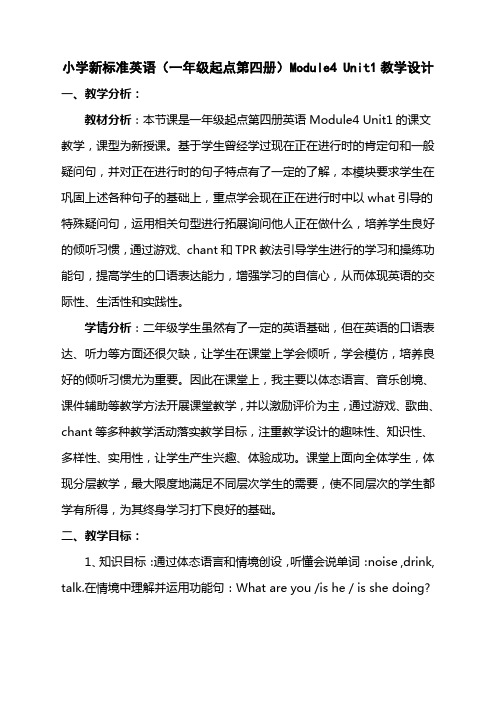
小学新标准英语(一年级起点第四册)Module4 Unit1教学设计一、教学分析:教材分析:本节课是一年级起点第四册英语Module4 Unit1的课文教学,课型为新授课。
基于学生曾经学过现在正在进行时的肯定句和一般疑问句,并对正在进行时的句子特点有了一定的了解,本模块要求学生在巩固上述各种句子的基础上,重点学会现在正在进行时中以what引导的特殊疑问句,运用相关句型进行拓展询问他人正在做什么,培养学生良好的倾听习惯,通过游戏、chant和TPR教法引导学生进行的学习和操练功能句,提高学生的口语表达能力,增强学习的自信心,从而体现英语的交际性、生活性和实践性。
学情分析:二年级学生虽然有了一定的英语基础,但在英语的口语表达、听力等方面还很欠缺,让学生在课堂上学会倾听,学会模仿,培养良好的倾听习惯尤为重要。
因此在课堂上,我主要以体态语言、音乐创境、课件辅助等教学方法开展课堂教学,并以激励评价为主,通过游戏、歌曲、chant等多种教学活动落实教学目标,注重教学设计的趣味性、知识性、多样性、实用性,让学生产生兴趣、体验成功。
课堂上面向全体学生,体现分层教学,最大限度地满足不同层次学生的需要,使不同层次的学生都学有所得,为其终身学习打下良好的基础。
二、教学目标:1、知识目标:通过体态语言和情境创设,听懂会说单词:noise ,drink, talk.在情境中理解并运用功能句:What are you /is he / is she doing?2、能力目标:能在语境和情境中运用功能句进行简单的有关他人在做什么的话题描述。
3、情感、态度、价值观:在活动中,学生学会运用所学知识进行交流,并在交流中学会关心他人,体验合作、参与的乐趣。
三、教学重点:1、听懂会说noise, drink, talk等词以及drink, talk的现在分词:drinking, talking.2、听懂、会说、理解功能句What are you / is he / is she doing?四、教学难点:能用功能句进行简单的交流,关注他人行为。
新视野英语教程教案book4unit1
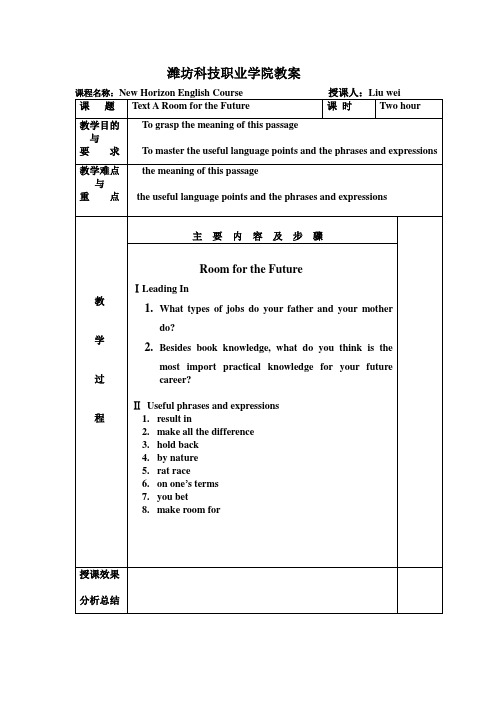
潍坊科技职业学院教案Room for the FutureⅠLeading In1. What types of jobs do your father and your mother do?2. Besides book knowledge, what do you think is the most importpractical knowledge for your future career?II Key points1. Room for the FutureMeaning: possibility or scope for one's future development2. After twenty-two years of working for a major bank, a downsizing wave resulted in the elimination of over one hundred jobs, mine being one of them.Meaning:Having worked for a big bank for twenty-two years, I lost my job, together with more than one hundred of my colleagues because the bank wanted to reduce the number of its employees.3. My once secure future now seemed insecure.Meaning: I had always thought my future was safe, but it seemed unsafe now.Please notice "secure" and "insecure" are a pair of antonyms(反义词).secure:adj. a situation that is secure is one that you can depend on because it is not likely to change 稳固的;可靠的;稳定的Estate in this city is a secure investment.在这座城市,地产是可靠的投资。
高中英语人教新课标必修四Unit1 Woman of achievement教案
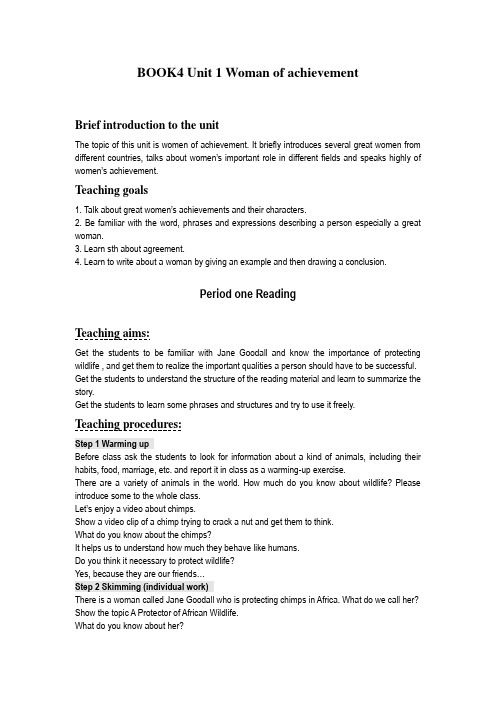
BOOK4 Unit 1 Woman of achievementBrief introduction to the unitThe topic of this unit is women of achievement. It briefly introduces several great women from different countries, talks about women’s important role in different fields and speaks highly o f women’s achievement.Teaching goals1. Talk about great women’s achievements and their characters.2. Be familiar with the word, phrases and expressions describing a person especially a great woman.3. Learn sth about agreement.4. Learn to write about a woman by giving an example and then drawing a conclusion.Period one ReadingTeaching aims:Get the students to be familiar with Jane Goodall and know the importance of protecting wildlife , and get them to realize the important qualities a person should have to be successful. Get the students to understand the structure of the reading material and learn to summarize the story.Get the students to learn some phrases and structures and try to use it freely.Teaching procedures:Step 1 Warming upBefore class ask the students to look for information about a kind of animals, including their habits, food, marriage, etc. and report it in class as a warming-up exercise.There are a variety of animals in the world. How much do you know about wildlife? Please introduce some to the whole class.Let’s enjoy a video about chimps.Show a video clip of a chimp trying to crack a nut and get them to think.What do you know about the chimps?It helps us to understand how much they behave like humans.Do you think it necessary to protect wildlife?Yes, because they are our friends…Step 2 Skimming (individual work)There is a woman called Jane Goodall who is protecting chimps in Africa. What do we call her? Show the topic A Protector of African Wildlife.What do you know about her?Jane Goodall博士于2002年4月16日被任命为联合国和平使者。
book4 unit1 Language points

10. “Once I stop, it all comes crowding in and I remember the chimps in laboratories…” “我一旦停下来,所有的一切都会涌上心 头。我就会想起实验室的黑猩猩……”
(2) Yinxin bought a new house, and she planned
to move __i_n___ next month.
5. (写作词汇)However, the evening makes it all
worthwhile. 不过到傍晚时分我们觉得这一切都是值得的。
worthwhile adj. 值得的, 值得做的 e.g. The effort seemed worthwhile.
help her for the first few months was she
allowed to begin her project. 她母亲头几个月来帮她的忙, 这才使她得以开 始自己的计划。 这是一个倒装句。 将only及其后面的状语提前放在句首, 句子要 用部分倒装语序,即将be动词、助动词或情 态动词放在主语之前。
• 11.(写作词汇)once引导时间状语从句,即: Once I stop。在主句中crowding in是动词ing短语作状语修饰comes。
• once用作连词时,意为“一旦……就……”, 用于连接时间状语从句。如:
[仿写] 1)一旦你开始读, 你就会喜欢它。
He is highly respected for his novels. 他因他的小说而极受敬重。
8. (重难点词汇)For forty years Jane Goodall has been outspoken about making the rest of the world understand and respect the life of animals. 1) 争论,争辩 argue with sb about/over/on sth They are arguing over foreign policy. 他们在讨论外交政策。 Don't argue with me. 不要和我争辩。
八年级英语下册 Module 1 Unit 1 It smells delicious教案 (新版)
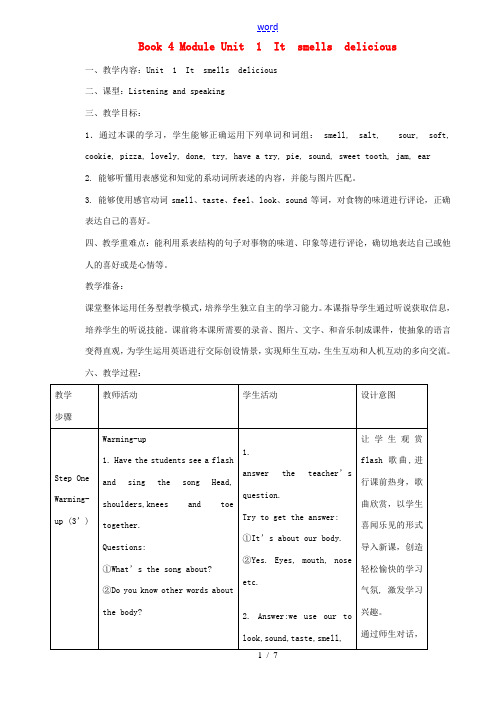
Book 4 Module Unit 1 It smells delicious一、教学内容:Unit 1 It smells delicious二、课型:Listening and speaking三、教学目标:1.通过本课的学习,学生能够正确运用下列单词和词组: smell, salt, sour, soft, cookie, pizza, lovely, done, try, have a try, pie, sound, sweet tooth, jam, ear2. 能够听懂用表感觉和知觉的系动词所表述的内容,并能与图片匹配。
3. 能够使用感官动词smell、taste、feel、look、sound等词,对食物的味道进行评论,正确表达自己的喜好。
四、教学重难点:能利用系表结构的句子对事物的味道、印象等进行评论,确切地表达自己或他人的喜好或是心情等。
教学准备:课堂整体运用任务型教学模式,培养学生独立自主的学习能力。
本课指导学生通过听说获取信息,培养学生的听说技能。
课前将本课所需要的录音、图片、文字、和音乐制成课件,使抽象的语言变得直观,为学生运用英语进行交际创设情景,实现师生互动,生生互动和人机互动的多向交流。
六、教学过程:达标训练题一. 根据句意和汉语提示完成句子。
1. 这菜闻起来好香啊.The dish _______________.2. 这汤尝起来不新鲜.The soup ______________ fresh.3. 这毛衣摸起来很软很舒服。
The sweater _______________________.4. Children like _______ (小甜饼)very much.5. People should eat less ______ ( 盐 ) everyday.6. Oh. It’s my _______(幸运的)day. I'vepassed the exam.二. 单项选择:1. These flowers ______beautiful. I will buysome for my mother.A. lookB. soundC. hearD. taste2. The air in the countryside smells _______.A. sourB. softC. deliciousD. fresh3. The idea ________ good. We can try it.A. tasteB. tastesC. soundsD. sound4. This game is so interesting, please_____ .A. have a lookB. give upC. have a tryD. try some5. Last Sunday was my mother’s birthday, so I _____ a big meal for her.A. cookB. cooksC. cookedD. is cooking。
Kid's Box 剑桥少儿英语 第四册 第一单元 教案 Introductory Unit Book 4

《剑桥国际少儿英语》第四册教案
单元目标语言:
语词:职业(teacher, doctor, dentist, farmer, detective),家庭,形容词(funny, hungry, thirsty, loud, quiet, happy, clever, tired, young, old, beautiful, sad),日常活动,wear, routine, always, sometimes, never
结构:问候,形容词比较级(older than),描述人物,定义,一般现在时,频度副词,祈使句,love –ing, want to be, would like to, have got, must, before/after
单元技能目标:
听:听懂谈论日常活动的对话,弄清事件发生的先后顺序,能听懂关于人物描述的句子,能听出押韵的词。
说:能询问个人基本信息,描述人物,会用一般现在时态谈论日常活动,会唱一首英文歌。
读:能读懂描述人物日常生活的短文、小故事、歌词等。
写:能用描述人物的语言描写人物,能写出用一般现在时及频度副词描述日常活动的句子及短文。
第二课时Lesson 2
第五课时Lesson 5
第六课时Lesson 6。
高一英语新教材教学Book1 Unit4 案例一则

高一英语新教材教学Book1 Unit4 案例一则内容提要:高一英语新教材教学案例一则:教材分析:本课时为高一新教材模块一第四单元的Warming up 和Pre-reading。
从教学要求来看,本课时主要是为了让学生掌握一些有关自然灾害的知识,对于一些自然灾害的名称,做到能够脱口而出。
在这个环节中,书本上为我们的学生提供了两张图片,一张是一个现代化的城市景象,另一张是经历了地震之后陷入一片废墟中的城市景象。
要求学生学会比较两张图片中的不同之处,并在此基础上能说出诸如地震之类的自然灾害给人类带来的损害与破坏。
学生分析:高一的学生较高二、高三的学生而言,也许也算得上是活泼的。
然而,因为他们是高一学生了,所以,他们也已然没有初中学生的那种畅所欲言。
有时候,因为怕难为情或者是因为面子关系,即使他们知道了解的知识,他们也会羞于言。
我所任教的这个班级是高一13班,这个班级的特点是女生数目明显多于男生,而且大多数的男生英语基础相当差。
女生中倒有几个“领头羊”,面对教师的提问,她们愿意说也敢于说。
在这样一种气氛中,要进行这一课时的教学,其实就不难了。
教学环节设计:针对课时的要求以及这个教学班的具体情况,我对于Warming up的教学安排作了如下的设计,主要的目的是为了调动学生在课堂上的积极性,让那些会说敢说的学生带动其他的学生,让他们在一些问答环节和小组活动环节中,能真正地动起来。
并且使学生通过本课时的学习,能够对于一些自然灾害有所了解,对于自然灾害造成的损害也能用自己的语言来描述出来。
这些设计其实都是为后面的阅读文章作铺垫的。
整个教学过程如下:Step I. RevisionCheck the homework with the whole class.Step II. Warming upAsk the students to read the instructions and make sure they know what to do, and then have a discussion about the two pictures.T: Today, before we begin our reading, I’d like to ask you a question, “What is the biggest sound you have heard in your li fe?”S1: The sound of wind that blew in a winter night when I was very young. It sounded like a ghost who was howling. I was very frightened at that time.S2: The biggest noise was the one that I heard when my neighbor was quarrelling with his wife. Perhaps, they broke their TV set.T: That’s too terrible.S3: The noise when planes take off.S4: The sound of trains.T: Good! I agree that all of them are big sound. But did you once heard the sound that the heaven falls and the earth cracks, in Chinese it is 天崩地裂?Ss: No, we have no chance to hear that.T: If there is a sound like this, what is it?S5: When someone hears something unexpected and terrible. For example, when one of his loved families dies, he will feel this sound.T: Terrific! You are using a literary way to express the sound.S6: When an earthquake happens.T: Great! I have waited for this answer for a long time. Today we’ll learn something about earthquakes. I think most of us have heard of earthquakes. Can you imagine how terrible it is ?S7: The earth is shaking. All the buildings will fall down.S8: Many people will die. And perhaps many children will lose their parents.T: Yeah, earthquakes are disasters to everybody. Now look at the two pictures of Tangshan and San Francisco. Can you describe what you see in the pictures?S1: Tangshan is a beautiful city. It has beautiful gardens, broad roads and some tall buildings.S2: From the picture of San Francisco, I can see that it is a very big city. There are many tall buildings thickly standing on the earth. I think the population of the city is very large.T: Good! What will happen if there has been a big earthquake in these two cities? Work in pairs and discuss it. Then I’ll ask so me of you to show your opinion.Step III. Pre-readingThere are two questions in this part. Both are very interesting. The first one can more or less reveal the students’ values; while the second one can enlarge their imagination. No matter what their answers are, as long as they have given careful thoughts to the situations, their answers should be good.T: Now, let’s look at the pictures. What are the predictions of an earthquake?S1: Before an earthquake animals will become nervous. Cows, pigs, horses and dogs will be upset. And people can see mice running about. If the earthquake happens during winter, people can even see snakes.T: Terrific! Where did you get this knowledge?S1: From geography. I like it.T: good. Sit down please.S2: Madam, I don’t know the meaning of the picture with two wo men.T: It doesn’t matter. You will know it soon after reading our text. OK. Imagine there is an earthquake now, and your home is shaking, at this moment you have no time to take any other things but one, what will it be?S3: I’ll take all my money. People can’t live without money.S4: I will take as much water as possible. Because it is said that people can keep alive for nearly 7 days by drinking without any foodS5: In that case, I’d rather take some apples, so that be sides drinking, I can also eat.S6: I will carry my grandma. She is my most loved person in this world. She brought me up.T: What a dutiful child you are! I’m very glad to hear that. Sit down please! It seems that all of you know what you should do during an earthquake.教后反思:在分课时教学时,我基本按照教学设计来做。
牛津译林版英语8B 八年级下册Unit4Reading1教案
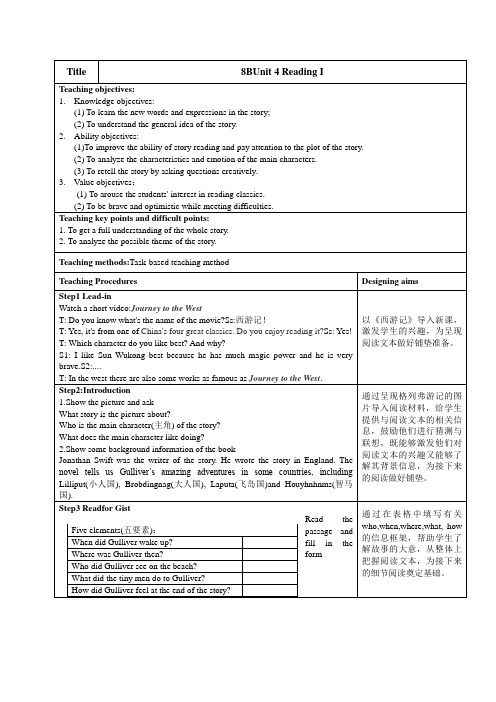
Step4 Read for Details
Task1:ReadPara.1 and answer the following two questions:
Teaching Procedures
Designing aims
Step1 Lead-in
Watch a short video:Journey to the West
T:Do you know what's the name of the movie?Ss:西游记!
T:Yes, it's from one ofChina's four great classics. Do you enjoy reading it?Ss: Yes!
(4)What do you think of the tiny men?
(5)If you are tiny men, what will you talk about ?
Task5:ReadPara.5 and complete the blanks
根据不同段落,提供给学生不同阅读任务,从各个方面来锻炼学生的综合语言运用能力,使学生加深对故事情节和故事人物的理解,在提升语言运用能力的同时,也让学生在阅读中感受文学名著语言的魅力。与此同时通过小组成员之间互相合作,既降低了难度节约了时间又让学生体验到了与人合作的快乐。
Para.5couldn’tunderstand-managedto-lifted-lookeddown-began talking-began…
这个故事接龙的活动其实是对阅读文本的复述,学生可以根据文本的内容和自己的想象以及小组成员的合作来完成这个任务。复述故事的过程中,不仅用到阅读文本中的语言,更多的是用自己的语言将故事完整的表述出来。
2021年名师:She's reading a book 4优秀教学教案说课稿
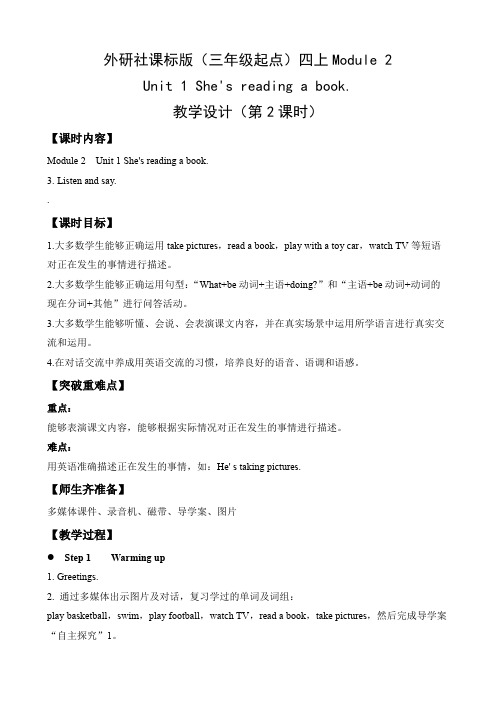
外研社课标版(三年级起点)四上Module 2Unit 1 She's reading a book.教学设计(第2课时)【课时内容】Module 2 Unit 1 She's reading a book.3. Listen and say..【课时目标】1.大多数学生能够正确运用take pictures,read a book,play with a toy car,watch TV等短语对正在发生的事情进行描述。
2.大多数学生能够正确运用句型:“What+be动词+主语+doing?”和“主语+be动词+动词的现在分词+其他”进行问答活动。
3.大多数学生能够听懂、会说、会表演课文内容,并在真实场景中运用所学语言进行真实交流和运用。
4.在对话交流中养成用英语交流的习惯,培养良好的语音、语调和语感。
【突破重难点】重点:能够表演课文内容,能够根据实际情况对正在发生的事情进行描述。
难点:用英语准确描述正在发生的事情,如:He' s taking pictures.【师生齐准备】多媒体课件、录音机、磁带、导学案、图片【教学过程】Step 1 Warming up1. Greetings.2. 通过多媒体出示图片及对话,复习学过的单词及词组:play basketball,swim,play football,watch TV,read a book,take pictures,然后完成导学案“自主探究”1。
3.教师出示相关图片,让学生用现在进行时的结构描述图片中的人物正在做什么,完成导学案“自主探究”2。
【设计思路】上课前的热身运动通过由词到句的深入,让学生复习了旧知,同时也为新课的学习做了铺垫,在活动中活跃了课堂气氛。
Step 2 Presentation1.教师向学生拓展“be doing”结构的用法。
完成导学案“合作探究”2。
Use the "be doing"form to fill in the blanks. 用“be doing”结构完成下列各题。
Book-4-Unit-1新视野第三版4教案

大学英语(yīnɡ yǔ)三(读写)教案过了收益。
7) discern v. notice sth. especially after thinking about it carefully or studying it(尤指仔细思考或研究之后)看出,觉察出,辨明We should learn to discern and analyze the essential of complicated questions.我们应该学会认识和分析复杂问题的本质。
8) crumble v. 1) stop existing or being effective 崩溃;瓦解;消失2) break sth. into very small pieces, or be broken into very small pieces 弄碎;(使)成碎屑Crumble the biscuits over the fruit mixture. 把饼干弄碎撒在水果拼盘上。
9) give sb. the axe end a relationship abruptly 抛弃(恋人等);和某人一刀两断Her boyfriend did not want to stop smoking, so she gave him the axe.她男朋友不肯戒烟,所以她和他断了关系。
10) ingenious a. good at inventing things and solving problems in new ways (人)有独创性的They are attacking the honest and ingenious scientist because his ideas are new.他们攻击这位诚实并富有独创能力的科学家,是因为他的观点新颖。
2 .While-reading ActivitiesStep 4. Intensive readingStudents are asked to read the passage carefully again and answer some detailed questions on the screen. During the reading, there is an explanation for the following points:Language Points:1. That year every guy on campus had a leather jacket, and Rob couldn’t stand the idea of being the onlyfootball player who didn’t, so he made a pact that he’d give me his girl in exchange for my jacket. (Para.1)Meaning: That year every young man in the college wore a leather jacket. Rob was the only one in the football team who didn’t have one. He felt frustrated whenever he thought about it, so he made an agreement with me that if I gave him my leather jacket, he would, as anexchange, give me his girlfriend.make a pact: 达成协议 in exchange for: 作为(对... 的)交换2. If I could show the elite law firms I applied to that I had a radiant, well-spoken counterpart by my side, Ijust might edge past the competition. (Para. 2)Meaning: When looking for a job, if I could show the top law companies that I had a partner who was notonly beautiful but also intelligent and polite, I might well be able to gain an advantage over mycompetitors and successfully get a job offer.3. “Radiant” she was already. I could dispense her enough pearls of wisdom to make her “well-spoken”.(Para. 3)Meaning: She was already very beautiful. And I could teach her to speak intelligently so that she wouldsound very pleasant and smart when she speaks.Meaning beyond words: The word “dispense”, which means “give sth. to people”, showsthat the narratorregards himself far superior to the girl. He is again boasting and praising himself. The word shows hisarrogance and conceit.4. After a banner day out, I drove until we were situated under a big old oak tree on a hill off the expressway.(Para.4)Meaning: After spending an excellent day out with her, I drove my car to a hill by the highway. I stoppedwhen we were under a big old oak tree.banner a. 极好的;非常成功的 n. 横幅;横幅标语5.She seemed to have a good time. I could safely say my plan was underway. I took her homeand set a date for another conversation. (Para. 15)Meaning: It seemed that she had enjoyed my logic lesson very much. I was pretty sure that my plan was going on smoothly. I drove her home and decided on a date for our nextmeeting.underway 在进行中 set a date for 为.....定日期 e.g. They will set a date for thewedding.6. “The situations are altogether different. You can’t make an analogy between them”. (Para.24)Meaning: The situations are totally different. You can’t make a comparison between them.Make/ draw an analogy between: 在.....之间作类比E.g. It is difficult to make an analogy between cars and airplanes. 把汽车和飞机进行类比是很难的。
Outside_view 视听说 Book 4 Unit 1 教学课件

Outside view
8 Write a short summary of the video clip which should include:
➢ what Samantha was doing wrong in her first job interview
➢ what she should do in future interviews
by doing _r_e_s_e__a_r_c_h__o_n__th_e__p__o_s_it_io__n_a__n_d__th__e_____ _c_o_m__p_a__n_y___. 3 I don’t think you should go into an interview _h_a_v_i_n_g__n_o_t__p_r_a_c_t_is_e_d__w__it_h__s_o_m__e__o_f_t_h_e__q_u_e_s_t_io__n_s that are pretty standard. 4 There’s a whole range of things that have to do with _h_o_w___y_o_u__p_r_e_s_e_n_t__y_o_u_r_s_e_lf_____. 5 You need to think about _w__h_a_t_t_h_e__i_n_te__rv_i_e_w__e_r_i_s_ _a_c__tu__a_ll_y__lo_o__k_in_g__f_o_r___.
7 Another way of answering it is not telling about yourself, but telling about yourself _i_n__re__la_t_io__n_s_h_i_p _t_o__th_e__j_o_b__.
Module9 Unit1 Book4
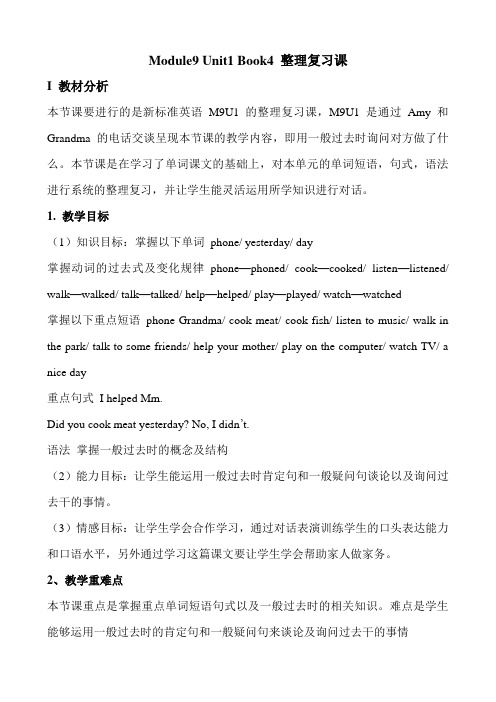
Module9 Unit1 Book4 整理复习课I 教材分析本节课要进行的是新标准英语M9U1的整理复习课,M9U1是通过Amy和Grandma的电话交谈呈现本节课的教学内容,即用一般过去时询问对方做了什么。
本节课是在学习了单词课文的基础上,对本单元的单词短语,句式,语法进行系统的整理复习,并让学生能灵活运用所学知识进行对话。
1.教学目标(1)知识目标:掌握以下单词phone/ yesterday/ day掌握动词的过去式及变化规律phone—phoned/ cook—cooked/ listen—listened/ walk—walked/ talk—talked/ help—helped/ play—played/ watch—watched掌握以下重点短语phone Grandma/ cook meat/ cook fish/ listen to music/ walk in the park/ talk to some friends/ help your mother/ play on the computer/ watch TV/ a nice day重点句式I helped Mm.Did you cook meat yesterday? No, I didn’t.语法掌握一般过去时的概念及结构(2)能力目标:让学生能运用一般过去时肯定句和一般疑问句谈论以及询问过去干的事情。
(3)情感目标:让学生学会合作学习,通过对话表演训练学生的口头表达能力和口语水平,另外通过学习这篇课文要让学生学会帮助家人做家务。
2、教学重难点本节课重点是掌握重点单词短语句式以及一般过去时的相关知识。
难点是学生能够运用一般过去时的肯定句和一般疑问句来谈论及询问过去干的事情II突破措施学生通过三年级四年级两年的英语学习具备了一定的听说读的能力也养成了一些学习英语的好习惯。
但四年级学生毕竟还不大,有些学生上课比较活跃,坐不住容易走神,也有学生羞于开口说英语。
高中英语单元复习课件 book4--Unit 1 Women of achievement

In our whole life, we will come __1___ different kinds of people and things. Therefore, our views of the world, life and value have been changing all the time. To be honest, one of my English teachers has made a great __2__on me.
2. This program was set up with an _i_n__t_e__n__t__io__n__
(intend) of providing help to homeless people.
3. [2015•天津高考]But Oshbot, like other social robots, is not intended ___t__o___r_e__p__l_a_c__e__(replace) workers, but to work alongside other emplos called the most exciting new development in this field.
(2018·天津高考)If you want to know more with/in reference to the competition, just contact me.
been Okay.
These latest developments argue a change in government policy.
For forty years Jane Goodall has been outspoken about making the rest of the world understand and respect the life of these animals. She has argued that wild animals should be left in the wild and not used for entertainment or advertisements.
- 1、下载文档前请自行甄别文档内容的完整性,平台不提供额外的编辑、内容补充、找答案等附加服务。
- 2、"仅部分预览"的文档,不可在线预览部分如存在完整性等问题,可反馈申请退款(可完整预览的文档不适用该条件!)。
- 3、如文档侵犯您的权益,请联系客服反馈,我们会尽快为您处理(人工客服工作时间:9:00-18:30)。
Unit1 Planting WorldReadingSchool: lTeacher:Class: Class Four, Grade OneSize:Time: 40minsDate: Material: BambooType of lesson: ReadingAids: chalks, blackboard, computerContents:1.V ocabularyBranch, bloom, shoot,stem, straight, sway, slim, ankles, cool, bloom, come up,hollow, nearly, pipe, crisp, tasty, ship, pulp2.ReadingBambooObjectives:1. Instructional aims (language knowledge and language skills)Students are able to recognize and understand these words such as branch, bloom,shoot,stem, straight, slim, bloom, hollow, pulp.2. Educational aims (affect, learning strategy and cultural awareness)1) Students can improve the ability of scanning.2) Students are able to talk the characters of bamboo.3) Students have deeper understanding of the bamboo in China.Focal points:1.Students can improve the ability of scanning.2.Students are able to talk the characters of bamboo.Difficult points:1.Students have deeper understanding of the bamboo in China.Procedures and Time AllotmentStage 1 Getting students ready for learning ( … mins)Step1. GreetingsStep2. Informal chartingStage 2 Pre-stage (… mins)Step1. Vocabulary presentation and practice1) Finish Getting Ready 12) Finish Getting Ready 2 by choosing the right answers.Step2. Discussion✧Is bamboo a kind of tree or grass?✧What can bamboo be used for? (over 4 uses)Step 3 Prediction by doing the T or F question.✧Although bambo o looks like a tree, it’s a kind of grass.✧All bamboos don’t grow tall.✧There are 500 different kinds of bamboo in all.✧All bamboos will die soon after they bloom.✧Bamboo is so strong that people often use it as good material for making finepaper.✧In wa rm places bamboo may grow thicker than a man’s waist.✧Bamboo can be found only in Chinese and Japanese dishes.✧Bamboo is not only used for building.Stage 4 While-stageStep1. Finish the comprehending 1.Read the article carefully and finish the T or F questions.Step2. Finish the two multiple choice on the PPT❖The reading passage is a/an .A. fableB. expositionC. argumentation❖The main idea of the text is that .A. The writer manages to persuade that bamboo is a kind of grass.B. It tells us what bamboo is, as well as its variety and uses.C. It tells us the various uses of bamboo and its spirits.Step3. Finish the Comprehending 2Fill in the missing words according to the article.Step4. Features of bambooRead the following poem and understand what aspect each line of the poem tries todescribe about bamboo.✧根为鞭兮枝为扫,叶为笠兮杆为宝;✧报得三春无人晓,仅学有节都长高;✧纵悟空心是个好,寺院内外难做到;✧还说骨硬仍是草,谁怜花开身即稿。
✧What bamboo is like (its root, branch, leaves and stem).✧Most bamboo grows high.✧Bamboo is hollow.✧Bamboo is actually a kind of grass and some blossom only once and then die.Step5. DescriptionImagine you will introduce the bamboo to the foreigners. How can you describe itwith the prompts words? (Grow up, look like, do with, wall, pipe; be madeof/into/from, flower vases, birdcage, drinking cups, in all)Stage 5 Post-stage (… mins)Step1. Discussion✧What other uses bamboo has in the text?✧Imagine any other uses bamboo may have in the future.Step2. Language points➢Ⅰ. Have you ever seen grass growing high as a tree——even a tall tree?growing high as a tree 现在分词作定语,相当于定语从句which grows highas treeV-ed, to do 也能作后置定语。
➢Ⅱ. It grows up straight and thin, with branches at the top.with 的复合结构作状语➢Ⅲ. Not all bamboo grows tall.不是所有的竹子都长得很高。
= All bamboos don’t grow tall.Not all…= All…not…部分否定全部否定:none of…; neither of…; nothing; none; nobody; neither; never;nowhere; nor; neither…nor➢Ⅳ. There are more than 500 different kinds of bamboo in all, and some grow no higher than your ankles.no higher than = as short asnot higher than = shorter thanno more…than 和……一样不;和……都not more…than 不及……➢Ⅴ. However, new shoots of bamboo will come out from around the roots of the old ones.➢Ⅵ. But the most interesting thing about this remarkable plant is what people do with it after it is cut down.what 引导的表语从句,作表语从句中动词do的宾语。
表语从句的连词还可以用that; whether或when、what 等特殊疑问词➢Ⅶ. Bamboo probably has more uses than any other plant in the world.more uses than any other plant 比较级形式表达最高级意义➢Ⅷ. In warm countries, many people have their houses made almost entirely of bamboo, the walls, the roof, and the floor.辨析have sb. do/ have sb. doing/ have sth. to do/ have sb. (sth.) done ➢Ⅸ. Nearly everything inside their houses is made of bamboo, too.be made of 由……制成(看得出原料)be made from 由……制成(看不出原料)be made into 由(零件或材料)制成成品be made up of 由……组成Stage 6 Assigning homeworkStep1. ConclusionStep2. Homework。
